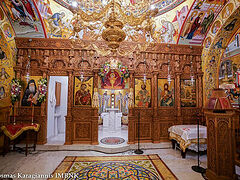Zakynthos, Greece, December 18, 2024
The Greek island of Zakynthos festively celebrated its patron, St. Dionysios, with reverence and splendor, including a procession with his relics through the city streets.
The celebrations began with the Holy Vigil at 3:00 AM, followed by Matins and the Hierarchical Divine Liturgy at 7:30, reports Ekklisia Online.
Following the Liturgy, the procession of St. Dionysios’ holy relics took place through the city, accompanied by hundreds of faithful who came to venerate their patron. The procession was accompanied by philharmonic bands and schools, as well as representatives of the security forces and local public figures.
The report does not name the participating bishops, though photos show at least seven hierarchs, including His Grace Bishop Emilianos of Meloa.
 Bp. Emilianos of Meloa is on the far right. Photo: ekklisiaonline.gr
Bp. Emilianos of Meloa is on the far right. Photo: ekklisiaonline.gr
The procession concluded with the return of the holy relics to the church where they are kept. Another procession will be held inside the church on Thursday morning, after which St. Dionysios’ relics will be returned to their reliquary.
***
 The relics of St. Dionysios. Photo: archaeology.wiki
The relics of St. Dionysios. Photo: archaeology.wiki
St. Dionysios of Zakynthos, the Bishop of Aegina was born in 1547 on the island of Zakynthos. Though born into a noble family, he was determined to flee the world and set his mind upon heavenly things. He entered the monastery of Strophada, and after the prescribed time, he was clothed in the angelic schema by the abbot. Though young in years, he surpassed many of his elders in virtue, and was found worthy of ordination to the holy priesthood.
Although he protested his unworthiness, St. Dionysios was consecrated Bishop of Aegina. In that office he never ceased to teach and admonish his flock, and many were drawn to him in order to profit from his wisdom. He feared the praise of men, lest he should fall into the sin of vainglory, so he resigned his See and returned to Zakynthos.
In 1579 the Diocese of Zakynthos was widowed (when a bishop dies, his diocese is described as “widowed”), and Dionysios agreed to care for it until a new bishop could be elected. Then he fled from the worldly life which gave him no peace, and went to the Monastery of the Most Holy Theotokos Anaphonitria, twenty miles from the main village.
A certain stranger murdered the saint’s brother Constantine, an illustrious nobleman. Fearing his victim’s relatives, the stranger, by chance or by God’s will, sought refuge in the monastery where St. Dionysios was the abbot. When the saint asked the fugitive why he was so frightened, he confessed his sin and revealed the name of the man he had murdered, asking to be protected from the family’s vengeance. St. Dionysios wept for his only brother, as was natural. Then he comforted the murderer and hid him, showing him great compassion and love.
Soon the saint’s relatives came to the monastery with a group of armed men and told him what had happened. He pretended to know nothing about it. After weeping with them and trying to console them, he sent them off in the wrong direction. Then he told the murderer that he was the brother of the man he had killed. He admonished him as a father, and brought him to repentance. After forgiving him, St. Dionysios brought him down to the shore and helped him to escape to another place in order to save his life. Because of the saint’s Christ-like virtue, he was granted the gift of working miracles.
Having passed his life in holiness, St. Dionysios reached a great age, then departed to the Lord on December 17, 1624. Not only are the saint’s relics incorrupt, but he is also one of Greece’s “walking saints” (St. Gerasimus and St. Spyridon are the others). He is said to leave his reliquary and walk about performing miracles for those who seek his aid. In fact, the soles of his slippers wear out and must be replaced with a new pair from time to time. The old slippers are cut up, and the pieces are distributed to pilgims. On August 24, we celebrate the Transfer of his Holy Relics. Through the prayers of St. Dionysios, may Christ our God have mercy upon us and save us.
Follow OrthoChristian on Twitter, Vkontakte, Telegram, WhatsApp, MeWe, and Gab!




